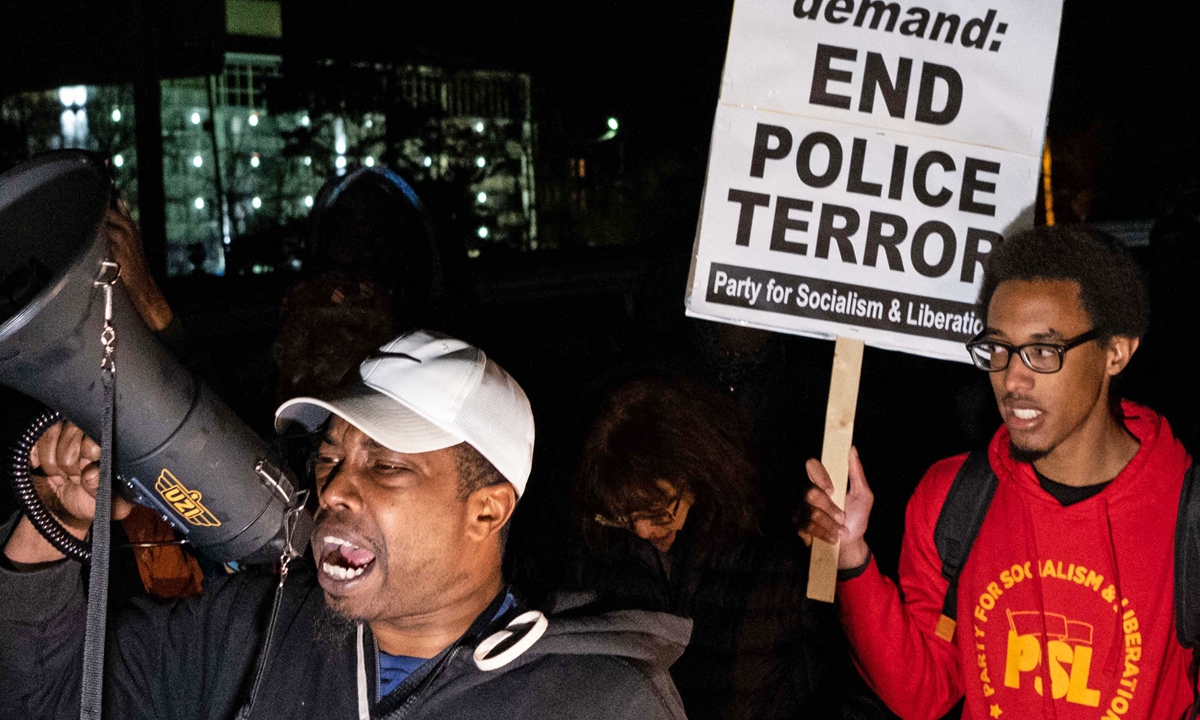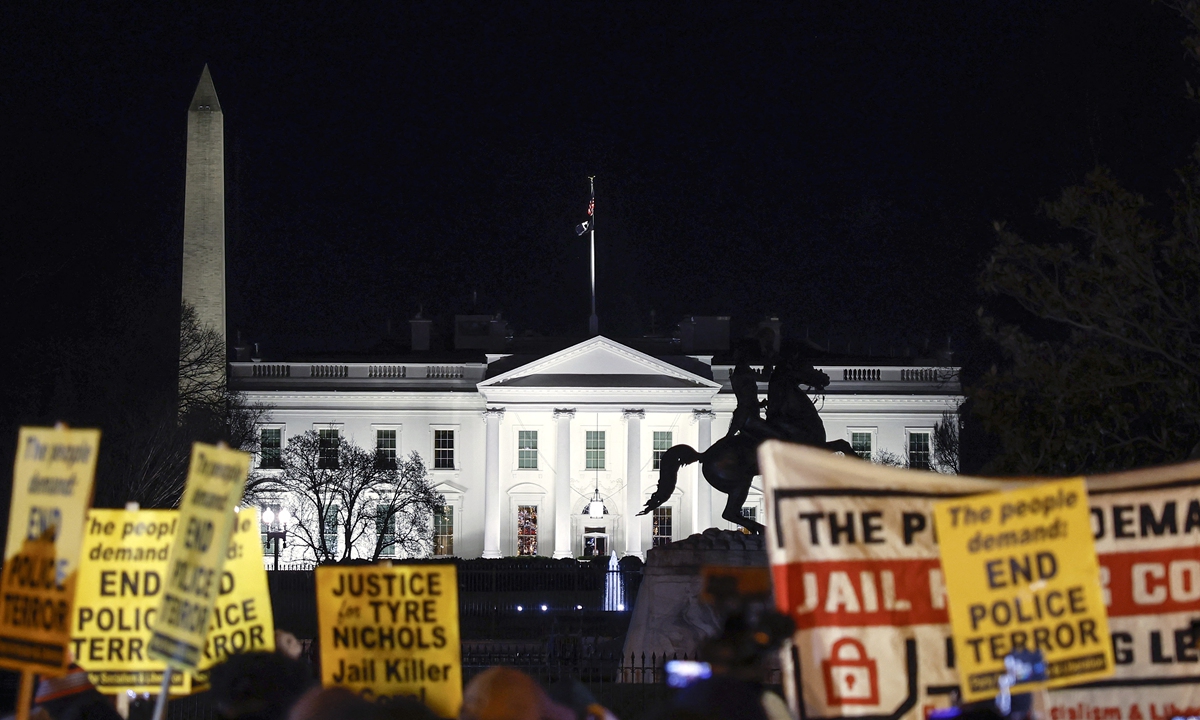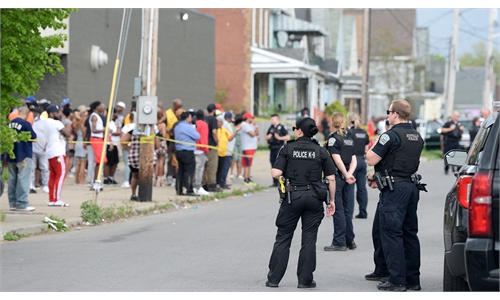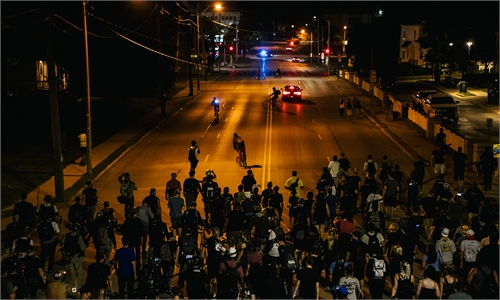Fatal Memphis police beating heralds 'culmination of racial conflicts' as US presidential election nears

Protesters block traffic as they rally against the fatal police assault of Tyre Nichols, in Memphis, Tennessee on January 27,2023. Photo:AFP

Demonstrators participate in a protest against the police killing of Tyre Nichols near the White House on January 27, 2023 in Washington, DC. Photo: AFP
The fatal Memphis police beating, which led to the death of 29-year-old Black man Tyre Nichols, has not only further unstitched the already loose fabric of US society, it weakens its internal cohesion and heralds a culmination of the racial conflicts of the last two years, as the 2024 presidential election approaches, with racial problems doomed to be hyped by rabble rouser politicians, said Chinese observers.
US society was on edge over a display of police violence caught on video, as the city of Memphis released on Friday evening body camera and surveillance footage of police officers kicking and punching the Black man who later died. The man, Tyre Nichols, ran after being pepper sprayed by officers, but shows no signs of fighting back as the police beat him with a baton, according to the footage.
"They had beat him to a pulp," Nichols' mother RowVaughn Wells told CNN, sobbing as she described him in hospital. "He had bruises all over. His head was swollen like a watermelon. His neck was bursting because of the swelling."
On Thursday, the five now-former Memphis police officers involved in Nichols' arrest, Tadarrius Bean, Demetrius Haley, Emmitt Martin III, Desmond Mills Jr, and Justin Smith, who are all Black, were charged on seven counts, including second-degree murder and aggravated assault.
It has been described by US media as one of the most high-profile police killings in the US since the death of George Floyd in May 2020. In Memphis, demonstrators began marching shortly after the video was released, and activists have planned demonstrations in Memphis and at least seven other major American cities: New York City, Washington, DC, Philadelphia, Chicago, Detroit, Boston and Portland, according to the Guardian.
The US is proud of being a "racial melting pot," yet without effective legislation to prevent excessive policing, a just system to guarantee minority groups' rights, the racial problem now becomes a growing tumor that is splintering social cohesion and will further divide the country, Li Haidong, a professor at the Institute of International Relations at the China Foreign Affairs University, told the Global Times.
The social issues, adding to minority groups' identity crisis, recognition of the country and their memories of unfair treatment, make racial problems unsolvable in the US. The best the politicians can do is ease the tension, but even that is harder to achieve given the country's poisonous political system that seeks to exploit racial problems to win only votes, not provide solutions, according to Li.
US President Joe Biden, anticipating protests after the Memphis video's release, called for calm, saying "outrage is understandable, but violence is never acceptable." Yet it was the same politician who vowed in 2020 to address "institutional racism" in his first 100 days, right after the country was outraged by the police killing of George Floyd.
But critics say the president has made little progress in solving racism since his election, including on voting rights and police reform, two major concerns for Black voters. Hate crimes against ethnic minorities only intensified during the recent years, including the mass shooting in a predominantly Black neighborhood in Buffalo last year, which led to death of 10 people.
A report from the Pew Research Center published in August 2022 showed that two-thirds of Black Americans say that recent increased focus on race and racial inequality in the US has not led to changes that improve the lives of Black people. "Overall, Black Americans are clear on what they think the problems are facing the country and how to remedy them," write Kiana Cox and Khadijah Edwards, the report's authors. "However, they are skeptical that meaningful changes will take place in their lifetime."
With the deteriorating racial problem further unstitching US society, this problem will also be a focal point of the 2024 presidential election, with racial conflicts likely to climax in the next half of this year up to the election period in late 2024, under US rabble rousers' manipulation, Lü Xiang, a research fellow at the Chinese Academy of Social Sciences, told the Global Times.
He predicted that conflict will not only be sparked between white and Black communities, it will also ferment between other minority groups, such as the Hispanic community.
If the Republicans nominate someone such as former US president Donald Trump, who has a repertoire of tricks to fan divisions, confrontation and hatred, the already intense racial problem will be more prominent, said Li, echoing Lü's opinion that racial problems will be intensified in the US.
Trump will be making his debut on the campaign trail this weekend in the pivotal early primary states of New Hampshire and South Carolina, amid signs of polling momentum for his 2024 presidential campaign, Axios reported on Wednesday.


